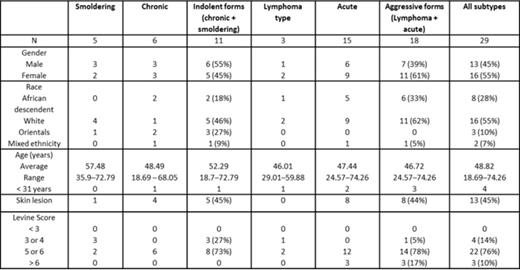Abstract
Background: Adult T-cell leukemia/lymphoma (ATLL) is a rare disease described in Japan in 1977 and associated with human T-cell leukemia virus 1 (HTLV-1) infection. It is classified into four subgroups [1]: smoldering and chronic forms which are considered indolent and acute and lymphoma subtypes that present an aggressive behavior and short overall survival (OS) despite the treatment. Here, we describe an ATLL experience at a reference cancer treatment institution in Sao Paulo, Brazil.
Methods: We retrospectively analyzed 29 ATLL patients who were attended from June/2006 to June/2015 at the Medicine School of Sao Paulo University, Brazil. ATLL was classified according to Shimoyama criteria [1] and Levine score [2] was used to estimate the probability of ATLL diagnosis. All patients were HTLV-1+. In the leukemic subtypes of ATLL, the neoplastic cells were CD3+/CD4+/CD8- or CD3+/CD4-/CD8- along with CD25+ and lack of CD7 expression. In the lymphoma type all patients showed a peripheral T cell lymphoma on their tissue biopsy. Statistical analysis was performed using GraphPad Prism Version 5.0 software.
Results: Table 1 shows the clinical characteristics of patients on diagnosis. Acute ATLL was associated with higher Levine's score. The average age on diagnosis was 48.82 years old (18.69-74.26). Our data is in accordance with previous Brazilian studies that showed lower average age on diagnosis. This could be related to earlier infection, intrinsic characteristics of virus strains circulating in Americas or host immune particularities. There was confection with B hepatitis, C hepatitis and HIV in three, two and one case, respectively. Forty-five per cent of the patients had skin lesions and eight patients presented central nervous system disease (4 of acute ATLL). No patient had concomitant HTLV-I-Associated Myelopathy/Tropical Spastic Paraparesis.
In our practice, smoldering ATLL was usually held in a watchfull-waiting approach. All six chronic ATLL patients were treated with interferon alpha and zidovudine (IFN+AZT) first-line. Progression-free survival (PFS) was 36.06 months and 12.4 months for smoldering and chronic subtypes, respectively. Acute and lymphoma subtypes had been treated with polichemotherapy, usually with CHOEP regimen (vincristine 1,4 mg/m2 i.v D1, doxorubicin 50mg/m2 i.v D1, cyclophosphamide 750mg/m2 i.v D1, etoposide 750 mg/m2 i.v D1, dexamethasone 20 mg i.v on day 1, prednisone 100 mg days 2 to 5) first-line. Overall average survival for lymphoma ATLL was 11.57 months, shorter than previous reports (average of 16 months, 86% treated with CHOP regimen [3]; survival of 19.7 months LSG15 protocol [4]). Eleven in 15 patients with acute ATLL had died after an average of 8.5 months (2.3 - 15.5) after the diagnosis. Overall survival for all subtypes was 15.17months (fig 1A), and 59.03; 44.47; 11.75 and 5.8 months (p= 0.0634) for smoldering, chronic, lymphoma and acute subtypes, respectively (fig 1B).
Conclusion: We found an OS of 5.8 months for acute ATLL treated with chemotherapy as first-line, which is comparable to literature (average survival of 6 months [3]) but shorter than those patients treated with first-line IFN+AZT (average survival of 9 months [3]). In our setting it is still scarcely available trioxide arsenic and clinical trials for ATLL, and allogenic transplant related to mortality is still high. We are therefore changing our practice according to recent recommendations and aiming to treat leukemic ATLL first-line with higher tolerated doses of IFN+AZT to improve our survival curve.
References
1. Shimoyama M. Diagnostic criteria and classification of clinical subtypes of adultT-cell leukaemia-lymphoma. A report from the Lymphoma Study Group (1984-87). Br J Haematol. 1991; 79(3):428-37.
2. Levine PH, et al. AdultT-cell leukemia/lymphoma: a working point-score classification for epidemiological studies. Int J Cancer. 1994; 59(4):491-3.
3. Bazarbachi A, et al. Meta-analysis on the use of zidovudine and interferon alfa in adult t cell leukemia/lymphoma showing improved survival in the leukemic subtypes. J Clin Oncol 2010; 28(27):4177-83.
4. Yamada Y, et al. A new gcsf supported combination chemotherapy LSG15, for adult T-Cell leukaemia -lymphoma: japan clinical oncology group study 9303. Br J Haematol 2001; 113(2):375-82.
Overall survival for all casuistic (A) and for each subtype of ATLL patients (B).
Overall survival for all casuistic (A) and for each subtype of ATLL patients (B).
No relevant conflicts of interest to declare.
Author notes
Asterisk with author names denotes non-ASH members.



This feature is available to Subscribers Only
Sign In or Create an Account Close Modal